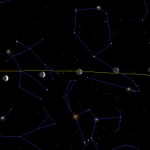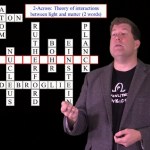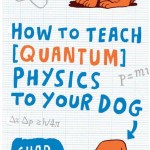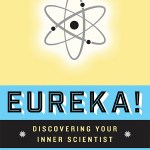Science Books
Returning to our mostly-chronological ordering after yesterday's brief excursion, we come to one of the great problems of the 1700's, namely determining the longitude at sea. Latitude is easy to find, based on the height of the Sun at noon-- we told that story last week-- but longitude is much trickier. Thanks to the rotation of the Earth, the best way to measure longitude is by measuring time-- if you know what time it is where you are, and what time it is at some reference point (now established as Greenwich, UK), the difference between those times tells you the difference in longitude.…
Last week Kate pointed me to this post about heroic stories of science saying "This seems relevant to your interests." And, in fact, a good deal of the post talks about Patricia Fara's Science: A Four Thousand Year History, the Union library's copy of which is sitting on my desk, where I had looked something up in it just that morning. (Specifically, the part where Fara notes that the distinction between "science" and "technology" is largely a class-based fiction, dividing high-status philosophers from grubby practical mechanics.)
There are a bunch of things going on in this, and most of them…
I've been trying to keep to a roughly chronological ordering of these stories, but this slow-motion snow storm that was waiting to greet us on our return from Florida made the schools open on a two-hour delay today, which eats the time I usually use for blogging and books stuff. So I'm going to jump forward three hundred years, to a story that I can outsource.
To set the stage, in the aftermath of WWII, Richard Feynman took up a faculty job at Cornell, but between working on the Manhattan Project and the death of his beloved wife, he found that he was completely burned out, and not able to do…
Today is the official release date for Eureka: Discovering Your Inner Scientist, so of course there are a bunch of exciting things happening:
-- There's a short excerpt at the Science of Us blog from New York Magazine. This is a chunk of the Introduction, about how scientists are smart, but not that smart.
-- I wrote a Big Idea essay at Whatever, talking about how this book is about the BIGGEST idea in the history of humanity. Which is only a tiny bit of hyperbole.
-- Rosemary Kirstein included Eureka as a gift suggestion, which is very cool, as she writes awesome books. You should check them…
I tooke a bodkine gh & put it betwixt my eye & [the] bone as neare to [the] backside of my eye as I could: & pressing my eye [with the] end of it (soe as to make [the] curvature a, bcdef in my eye) there appeared severall white darke & coloured circles r, s, t, &c. Which circles were plainest when I continued to rub my eye [with the] point of [the] bodkine, but if I held my eye & [the] bodkin still, though I continued to presse my eye [with] it yet [the] circles would grow faint & often disappeare untill I removed [them] by moving my eye or [the] bodkin.
If [the…
Copies of Eureka: Discovering Your Inner Scientist have been turning up in the wild for a while now, but the officially official release date is today (available from Amazon, Barnes and Noble, IndieBound, Powell’s, and anywhere else books are sold). To mark that, here's some stuff I wrote about the core message of the book, presented in Internet-friendly listicle form:
Eight Things You Need to Know About Science
1) Everybody Is a Scientist: Most people picture scientists as remote eggheads, who think in ways that ordinary people can’t comprehend, but the reality is very different. Scientists…
The first time you hear about dark matter, it sounds kind of crazy-- asserting that we're surrounded by tons of invisible stuff is usually a good way to get locked up. But the process of its discovery is surprisingly ordinary: it's just what you do when you play cards.
Here's the second green-screen video I've done to promote Eureka: Discovering Your Inner Scientist, which comes out three weeks from tomorrow (but can be pre-ordered today!). This one is about card games, modern astrophysics, and why you probbaly shouldn't play bridge against Vera Rubin:
For those who dislike video, I'll put…
My new book comes out one month from yesterday, or four weeks from tomorrow. Of course, yesterday was Sunday, and tomorrow's a federal holiday, both lousy times for promotional posts, so I'll drop this in today instead. Here's a promotional video I put together, about how the history of quantum mechanics can be compared to working a crossword puzzle:
This is basically the talk I gave at TED@NYC last year, done in front of a green screen with slides edited in behind me for that An Inconvenient Truth vibe (Nobel committee, take note...). With some bonus cute kid photos and an explicit…
I enjoyed Caleb Scharf's previous book, Gravity's Engines a good deal, so I was happy to get email from a publicist offering me his latest. I'm a little afraid that my extreme distraction of late hasn't really treated it fairly, but then again, the fact that I finished it at all in my current state of frazzlement may be the best testament I can offer to its quality. This is a sweeping survey of what we've learned about our place in the universe over the last five hundred years or so.
Now, a grandiose description like that often portends a bunch of wifty philosophizing that poses grand…
The exciting news of the week: Eureka: Discovering Your Inner Scientist has gotten a starred review in Publishers Weekly. Woo-hoo!
They've said nice things about my previous two books, but getting the star is a big deal. And it's a really good capsule description of the book, with a great pull quote in the last sentence:
This fun, diverse, and accessible look at how science works will convert even the biggest science phobe.
Really, I can't ask for better than that.
I found out this was coming at the end of last week, where it was an absolute life-saver after some sanity-threatening stuff…
Eureka: Discovering Your Inner Scientist has officially been sent to the printers, so we're at the phase of things where I don't have anything to do but think about publicity. There are some reviews forthcoming, at least one of which I'm very happy about, but I'll share more about that when it becomes public. I've also picked up some nice blurbs from very smart folks:
"I know, I know, you think you're just not smart enough to be a scientist. Chad Orzel might convince you otherwise with Eureka. Drawing on basketball, stamp collecting, Angry Birds, Iron Chef, and Antiques Roadshow among his…
I get a fair number of books to review, but I'm often pretty bad about writing them up in a timely manner. Of course, most of them are well over 70 pages long, which is why I've managed to turn around Roberto Trotta's The Edge of the Sky: All You Need to Know About the All-There-Is in the course of a weekend.
As you can probably get from the title, this is a book about astronomy written in Up Goer Five style, using only the thousand most common English words (which are helpfully listed near the start of the book, in case you want to check whether he cheated...), plus proper names. And there'…
The new academic year starts this week-- first day of classes is Wednesday-- and I'm dealing with the usual chaos associated with the influx of a new class of students. Who now look to me only a tiny bit older than SteelyKid and the Pip in the above picture (and if you think that sharing that extremely cute photo is part of the motivation for this post, well, you're not wrong...).
This year, the madness of the new term is complicated by having been away for essentially all of August, and by the fact that I'm teaching an entirely new class this term: Astronomy 052: Relativity, Black Holes, and…
If you're making your weekly check of the ebook editions (Kindle, Nook) of my quantum book (I'm not the only one who regularly looks at these, right?), you may have noticed a change: they're no longer sporting the original black cover you'll see in the right sidebar, but a new cover based on the smash hit UK edition. This isn't a database glitch, but a new release, with a new cover and adding the word "Quantum" to the title.
I've made allusions on Twitter a few times to having exciting news I wasn't ready to share-- this is one of those things. The original edition sold reasonably well and…
I should really know better than to click any tweeted link with a huff.to shortened URL, but for some reason, I actually followed one to an article with the limited-reach clickbait title Curious About Quantum Physics? Read These 10 Articles!. Which is only part one, because Huffington Post, so it's actually five articles.
Three of the five articles are Einstein papers from 1905, which is sort of the equivalent of making a Ten Essential Rock Albums list that includes Revolver, Abbey Road, and the White Album. One of the goals of a well-done list of "essential" whatever is to give a sense of…
After a bit of a hiatus because of scheduling issues, Rhett and I are back to talk about... stuff. Mostly summer classes, World Cup soccer, and Twitter. Also, how we've each gotten a blog comment from Neil deGrasse Tyson.
Miscellaneous links:
-- My long-ago book review and Rhett's more recent complaint about Cosmos, where we each had a brush with scientific celebrity.
-- My silly cat tweet that's generated a huge amount of traffic:
Busy day at Schroedinger Industries... RT @EmrgencyKittens: How to organize your cats. pic.twitter.com/z3QS0fnSdL
— Chad Orzel (@orzelc) June 24, 2014
-- Rhett's…
As noted earlier, I was a guest on the Read Science! hangout on G+ earlier today. If you weren't able to watch it live, the video is available at that link, and I'll embed it here:
There were some feedback problems with the audio for a little while-- annoyingly, it only got bad once the hangout went live-- there was a tiny echo when we were talking about logistics beforehand, but not enough to justify screwing around with earbuds. then when we started the actual event, it suddenly got completely awful for a while. It does get better, though-- I have no idea why, but later on, the echo is…
My Thursday presentation here in Houston went well, though it was a pretty small crowd. I'll be doing it again today before running to the airport to get home. I didn't really have an opportunity to do shameless self-promotion regarding the new book, but I did get a copy of the official cover for it, which you'll see above if you're looking at this on the blog, or below if you're reading via RSS.
I don't have a very detailed schedule for the rest of the process, but the target on-sale date is in early January 2015. Which probably dashes my dream of getting on the Colbert Report, but I'll…
One of the pop-physics books I've read recently was Amanda Gefter's much-discussed Trespassing on Einstein's Lawn. I was going to post a review of it back in March, but literally the day I was planning to write it, I got email from an editor at Physics Today asking if I had any books I'd like to review for them. So it ended up there instead of here:
Amanda Gefter’s Trespassing on Einstein’s Lawn comes with a super-sized subtitle: “A Father, a Daughter, the Meaning of Nothing, and the Beginning of Everything.” It’s a mouthful, but also rather fitting for a book that manages to be many things…
Given the academic circles I run in, it's not surprising that one of the most repeated stories crossing my social media feeds yesterday had to do with the changes to the SAT. Starting in 2015, the essay section will no longer be mandatory, and they're going to reconfigure the reading and math sections to emphasize different categories of questions.
My slightly cynical take on this is that changes seem to be driven more by marketing than education-- stories about this all mention that the changes make the new SAT more like the ACT, which has been gaining in popularity in recent years. Which…










